Experimentation Exposure Proposal: Aromatherapy Massage for Cancer
VerifiedAdded on 2022/08/12
|6
|1273
|31
Report
AI Summary
This report presents a student's proposal for a clinical study investigating the effectiveness of aromatherapy massage in improving the quality of life and reducing pain symptoms in cancer patients receiving palliative care. The introduction highlights the use of complementary therapies like aromatherapy massage. The discussion section reviews current research, including systematic reviews and randomized controlled trials, revealing conflicting results regarding the efficacy of aromatherapy massage. The proposed experimentation outlines interventions based on existing studies, emphasizing ethical considerations, participant selection, and randomization into experimental and control groups. Outcome measures, including quality of life, pain scores, fatigue, depression, and anxiety, will be assessed at various intervals. The conclusion emphasizes the need for further research and suggests that aromatherapy may be most beneficial when used in conjunction with conventional treatments. The report provides a detailed methodology for the proposed study.
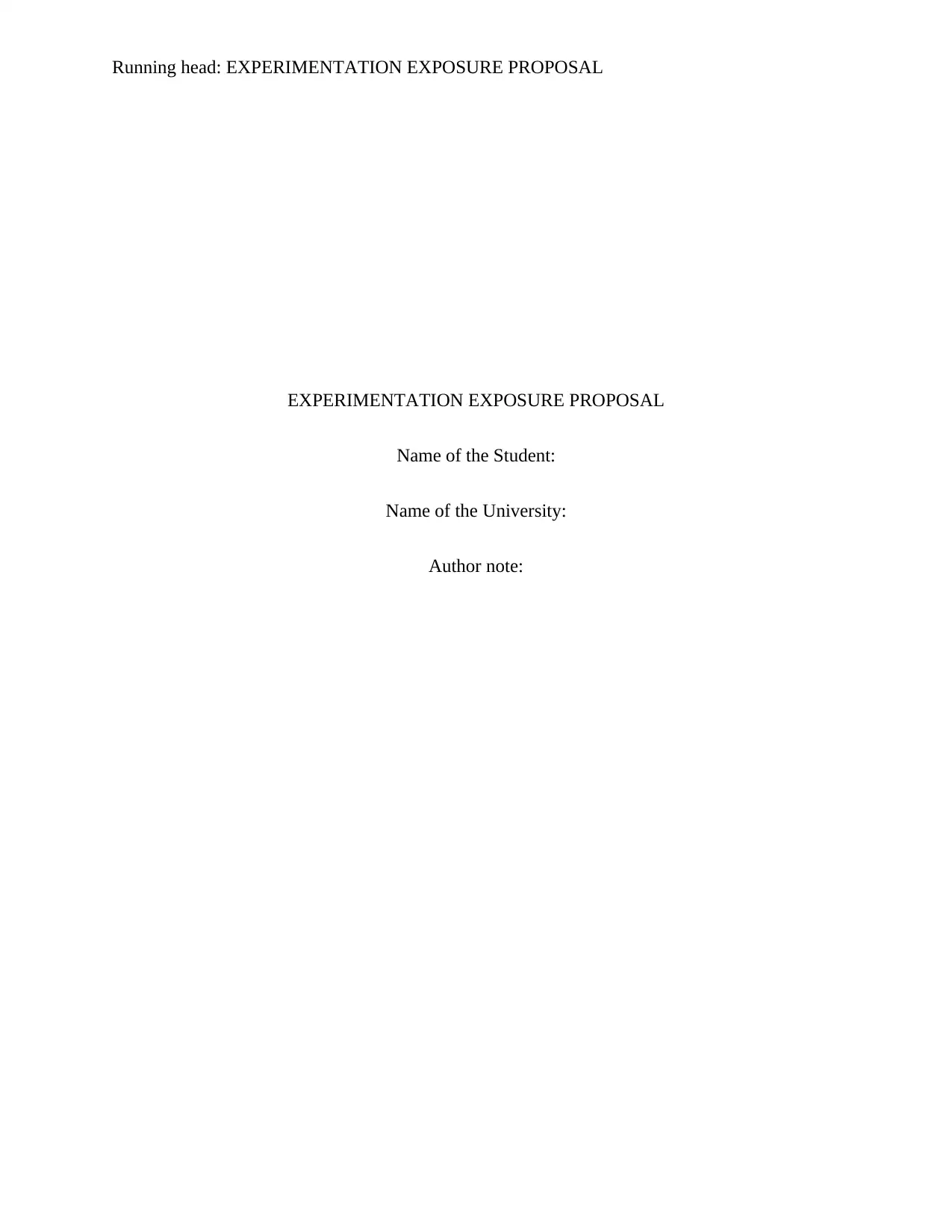
Running head: EXPERIMENTATION EXPOSURE PROPOSAL
EXPERIMENTATION EXPOSURE PROPOSAL
Name of the Student:
Name of the University:
Author note:
EXPERIMENTATION EXPOSURE PROPOSAL
Name of the Student:
Name of the University:
Author note:
Paraphrase This Document
Need a fresh take? Get an instant paraphrase of this document with our AI Paraphraser
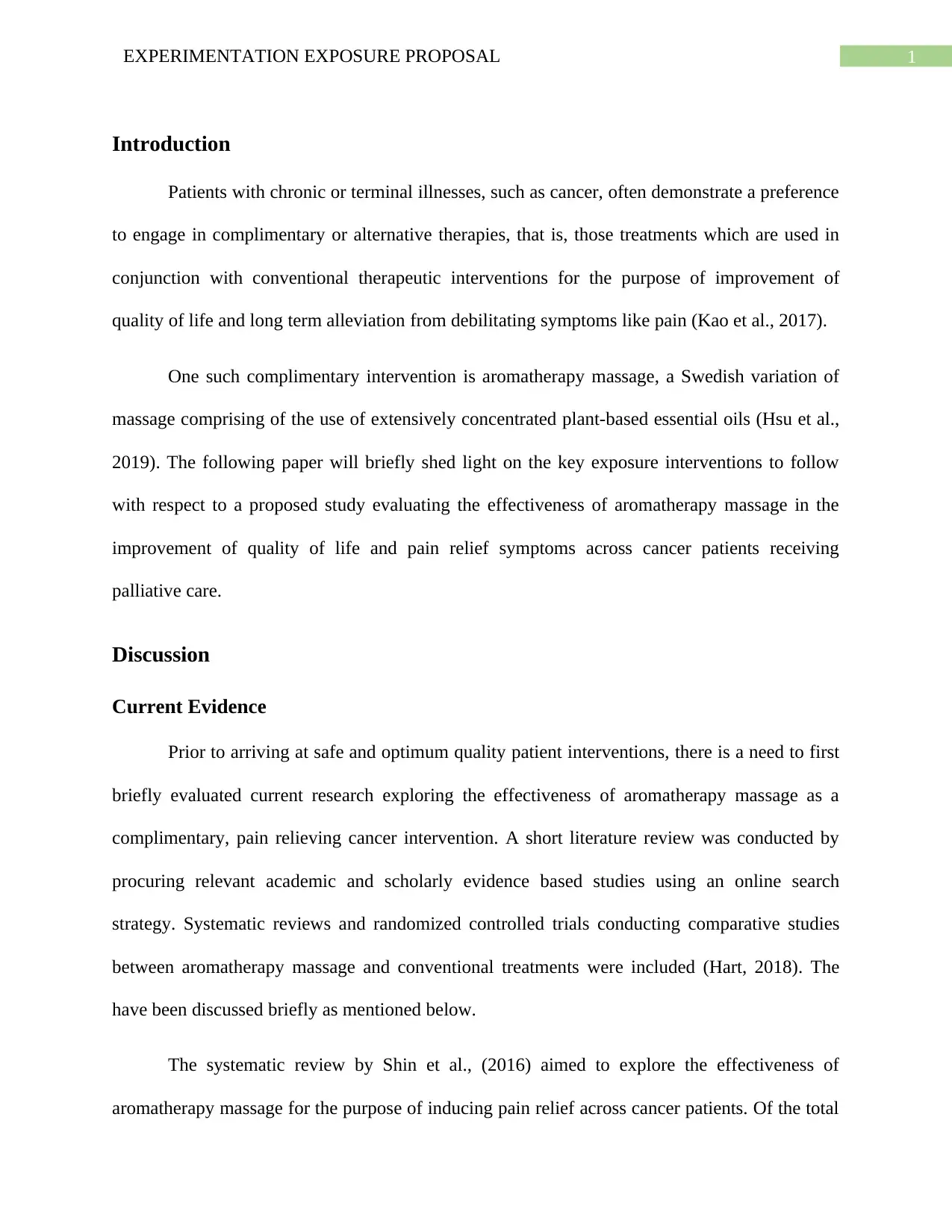
1EXPERIMENTATION EXPOSURE PROPOSAL
Introduction
Patients with chronic or terminal illnesses, such as cancer, often demonstrate a preference
to engage in complimentary or alternative therapies, that is, those treatments which are used in
conjunction with conventional therapeutic interventions for the purpose of improvement of
quality of life and long term alleviation from debilitating symptoms like pain (Kao et al., 2017).
One such complimentary intervention is aromatherapy massage, a Swedish variation of
massage comprising of the use of extensively concentrated plant-based essential oils (Hsu et al.,
2019). The following paper will briefly shed light on the key exposure interventions to follow
with respect to a proposed study evaluating the effectiveness of aromatherapy massage in the
improvement of quality of life and pain relief symptoms across cancer patients receiving
palliative care.
Discussion
Current Evidence
Prior to arriving at safe and optimum quality patient interventions, there is a need to first
briefly evaluated current research exploring the effectiveness of aromatherapy massage as a
complimentary, pain relieving cancer intervention. A short literature review was conducted by
procuring relevant academic and scholarly evidence based studies using an online search
strategy. Systematic reviews and randomized controlled trials conducting comparative studies
between aromatherapy massage and conventional treatments were included (Hart, 2018). The
have been discussed briefly as mentioned below.
The systematic review by Shin et al., (2016) aimed to explore the effectiveness of
aromatherapy massage for the purpose of inducing pain relief across cancer patients. Of the total
Introduction
Patients with chronic or terminal illnesses, such as cancer, often demonstrate a preference
to engage in complimentary or alternative therapies, that is, those treatments which are used in
conjunction with conventional therapeutic interventions for the purpose of improvement of
quality of life and long term alleviation from debilitating symptoms like pain (Kao et al., 2017).
One such complimentary intervention is aromatherapy massage, a Swedish variation of
massage comprising of the use of extensively concentrated plant-based essential oils (Hsu et al.,
2019). The following paper will briefly shed light on the key exposure interventions to follow
with respect to a proposed study evaluating the effectiveness of aromatherapy massage in the
improvement of quality of life and pain relief symptoms across cancer patients receiving
palliative care.
Discussion
Current Evidence
Prior to arriving at safe and optimum quality patient interventions, there is a need to first
briefly evaluated current research exploring the effectiveness of aromatherapy massage as a
complimentary, pain relieving cancer intervention. A short literature review was conducted by
procuring relevant academic and scholarly evidence based studies using an online search
strategy. Systematic reviews and randomized controlled trials conducting comparative studies
between aromatherapy massage and conventional treatments were included (Hart, 2018). The
have been discussed briefly as mentioned below.
The systematic review by Shin et al., (2016) aimed to explore the effectiveness of
aromatherapy massage for the purpose of inducing pain relief across cancer patients. Of the total
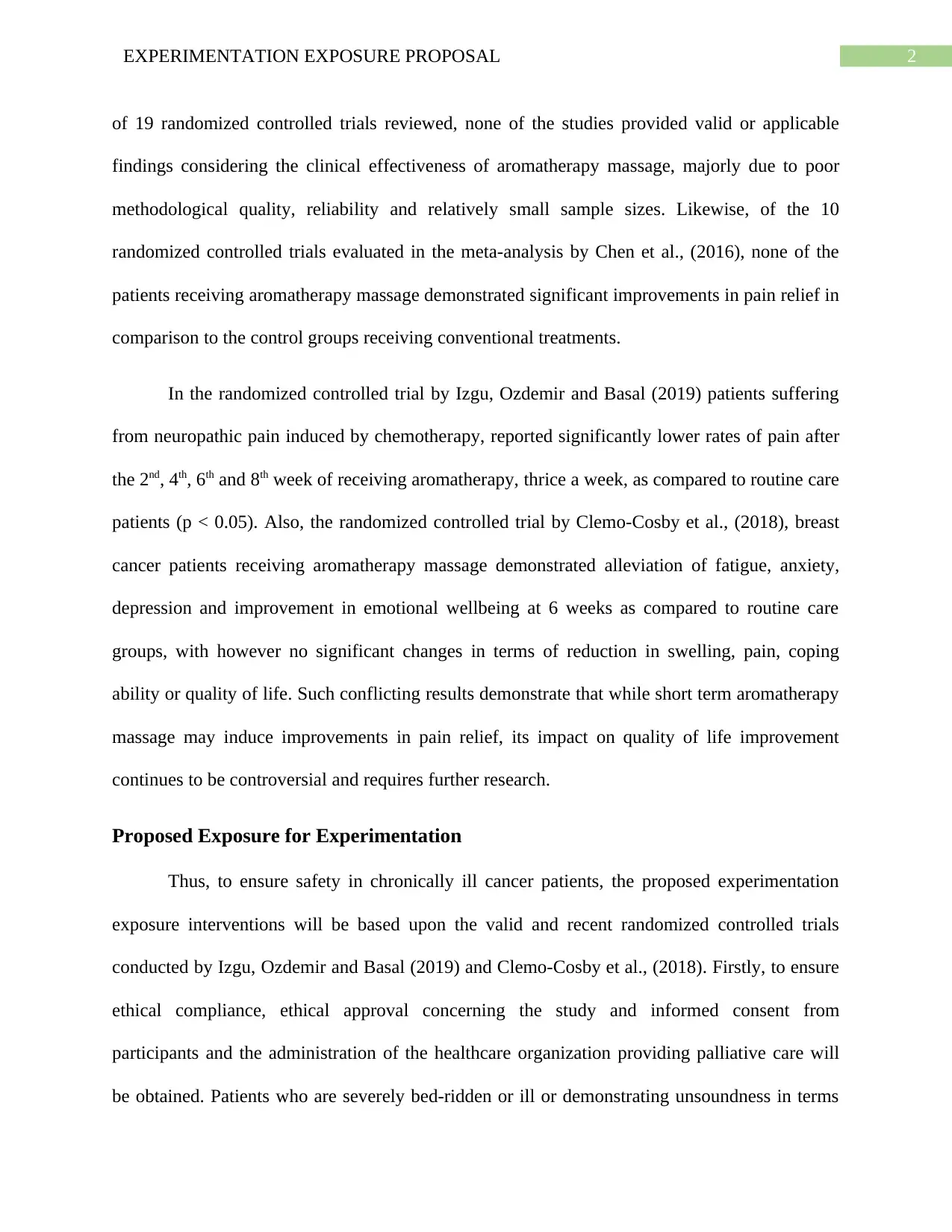
2EXPERIMENTATION EXPOSURE PROPOSAL
of 19 randomized controlled trials reviewed, none of the studies provided valid or applicable
findings considering the clinical effectiveness of aromatherapy massage, majorly due to poor
methodological quality, reliability and relatively small sample sizes. Likewise, of the 10
randomized controlled trials evaluated in the meta-analysis by Chen et al., (2016), none of the
patients receiving aromatherapy massage demonstrated significant improvements in pain relief in
comparison to the control groups receiving conventional treatments.
In the randomized controlled trial by Izgu, Ozdemir and Basal (2019) patients suffering
from neuropathic pain induced by chemotherapy, reported significantly lower rates of pain after
the 2nd, 4th, 6th and 8th week of receiving aromatherapy, thrice a week, as compared to routine care
patients (p < 0.05). Also, the randomized controlled trial by Clemo-Cosby et al., (2018), breast
cancer patients receiving aromatherapy massage demonstrated alleviation of fatigue, anxiety,
depression and improvement in emotional wellbeing at 6 weeks as compared to routine care
groups, with however no significant changes in terms of reduction in swelling, pain, coping
ability or quality of life. Such conflicting results demonstrate that while short term aromatherapy
massage may induce improvements in pain relief, its impact on quality of life improvement
continues to be controversial and requires further research.
Proposed Exposure for Experimentation
Thus, to ensure safety in chronically ill cancer patients, the proposed experimentation
exposure interventions will be based upon the valid and recent randomized controlled trials
conducted by Izgu, Ozdemir and Basal (2019) and Clemo-Cosby et al., (2018). Firstly, to ensure
ethical compliance, ethical approval concerning the study and informed consent from
participants and the administration of the healthcare organization providing palliative care will
be obtained. Patients who are severely bed-ridden or ill or demonstrating unsoundness in terms
of 19 randomized controlled trials reviewed, none of the studies provided valid or applicable
findings considering the clinical effectiveness of aromatherapy massage, majorly due to poor
methodological quality, reliability and relatively small sample sizes. Likewise, of the 10
randomized controlled trials evaluated in the meta-analysis by Chen et al., (2016), none of the
patients receiving aromatherapy massage demonstrated significant improvements in pain relief in
comparison to the control groups receiving conventional treatments.
In the randomized controlled trial by Izgu, Ozdemir and Basal (2019) patients suffering
from neuropathic pain induced by chemotherapy, reported significantly lower rates of pain after
the 2nd, 4th, 6th and 8th week of receiving aromatherapy, thrice a week, as compared to routine care
patients (p < 0.05). Also, the randomized controlled trial by Clemo-Cosby et al., (2018), breast
cancer patients receiving aromatherapy massage demonstrated alleviation of fatigue, anxiety,
depression and improvement in emotional wellbeing at 6 weeks as compared to routine care
groups, with however no significant changes in terms of reduction in swelling, pain, coping
ability or quality of life. Such conflicting results demonstrate that while short term aromatherapy
massage may induce improvements in pain relief, its impact on quality of life improvement
continues to be controversial and requires further research.
Proposed Exposure for Experimentation
Thus, to ensure safety in chronically ill cancer patients, the proposed experimentation
exposure interventions will be based upon the valid and recent randomized controlled trials
conducted by Izgu, Ozdemir and Basal (2019) and Clemo-Cosby et al., (2018). Firstly, to ensure
ethical compliance, ethical approval concerning the study and informed consent from
participants and the administration of the healthcare organization providing palliative care will
be obtained. Patients who are severely bed-ridden or ill or demonstrating unsoundness in terms
⊘ This is a preview!⊘
Do you want full access?
Subscribe today to unlock all pages.

Trusted by 1+ million students worldwide
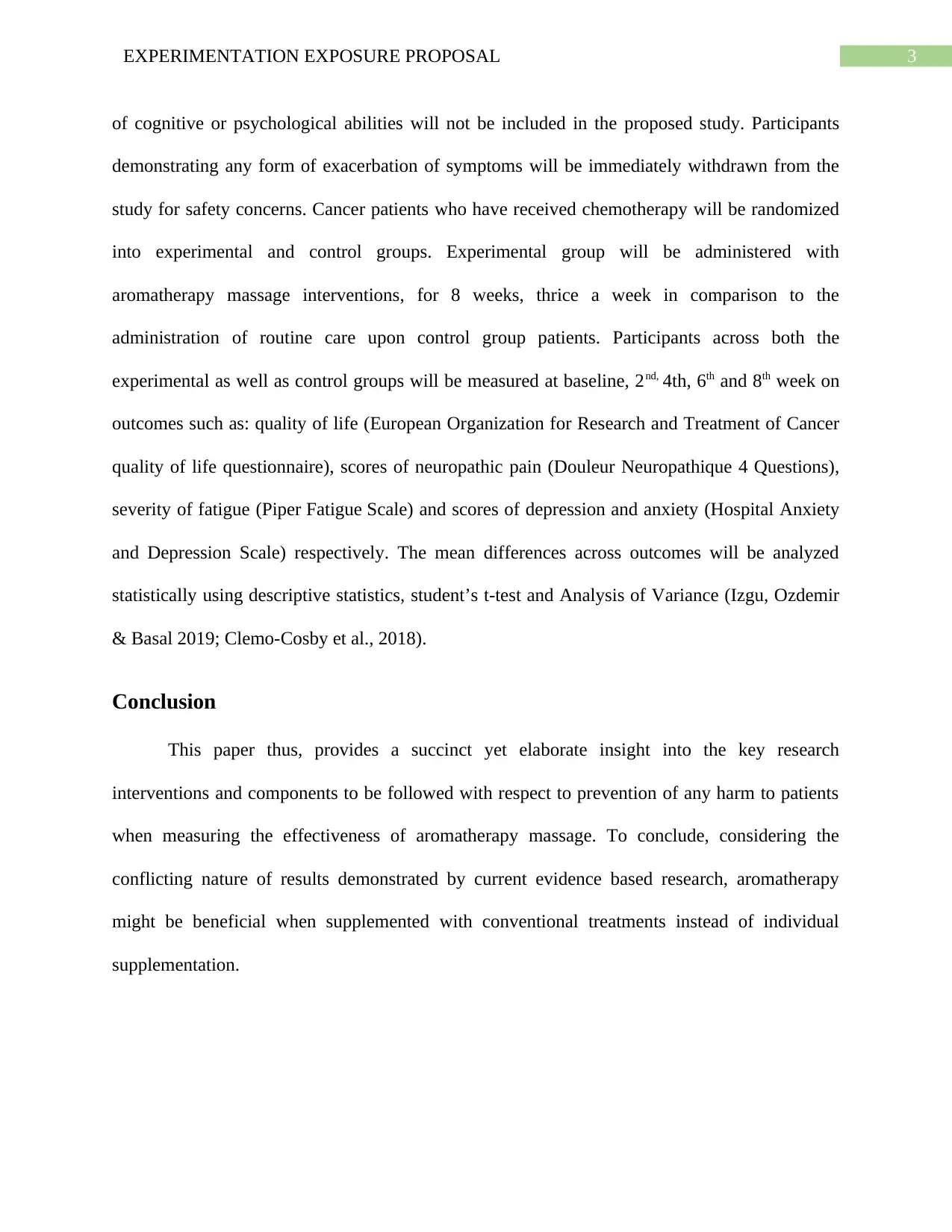
3EXPERIMENTATION EXPOSURE PROPOSAL
of cognitive or psychological abilities will not be included in the proposed study. Participants
demonstrating any form of exacerbation of symptoms will be immediately withdrawn from the
study for safety concerns. Cancer patients who have received chemotherapy will be randomized
into experimental and control groups. Experimental group will be administered with
aromatherapy massage interventions, for 8 weeks, thrice a week in comparison to the
administration of routine care upon control group patients. Participants across both the
experimental as well as control groups will be measured at baseline, 2nd, 4th, 6th and 8th week on
outcomes such as: quality of life (European Organization for Research and Treatment of Cancer
quality of life questionnaire), scores of neuropathic pain (Douleur Neuropathique 4 Questions),
severity of fatigue (Piper Fatigue Scale) and scores of depression and anxiety (Hospital Anxiety
and Depression Scale) respectively. The mean differences across outcomes will be analyzed
statistically using descriptive statistics, student’s t-test and Analysis of Variance (Izgu, Ozdemir
& Basal 2019; Clemo-Cosby et al., 2018).
Conclusion
This paper thus, provides a succinct yet elaborate insight into the key research
interventions and components to be followed with respect to prevention of any harm to patients
when measuring the effectiveness of aromatherapy massage. To conclude, considering the
conflicting nature of results demonstrated by current evidence based research, aromatherapy
might be beneficial when supplemented with conventional treatments instead of individual
supplementation.
of cognitive or psychological abilities will not be included in the proposed study. Participants
demonstrating any form of exacerbation of symptoms will be immediately withdrawn from the
study for safety concerns. Cancer patients who have received chemotherapy will be randomized
into experimental and control groups. Experimental group will be administered with
aromatherapy massage interventions, for 8 weeks, thrice a week in comparison to the
administration of routine care upon control group patients. Participants across both the
experimental as well as control groups will be measured at baseline, 2nd, 4th, 6th and 8th week on
outcomes such as: quality of life (European Organization for Research and Treatment of Cancer
quality of life questionnaire), scores of neuropathic pain (Douleur Neuropathique 4 Questions),
severity of fatigue (Piper Fatigue Scale) and scores of depression and anxiety (Hospital Anxiety
and Depression Scale) respectively. The mean differences across outcomes will be analyzed
statistically using descriptive statistics, student’s t-test and Analysis of Variance (Izgu, Ozdemir
& Basal 2019; Clemo-Cosby et al., 2018).
Conclusion
This paper thus, provides a succinct yet elaborate insight into the key research
interventions and components to be followed with respect to prevention of any harm to patients
when measuring the effectiveness of aromatherapy massage. To conclude, considering the
conflicting nature of results demonstrated by current evidence based research, aromatherapy
might be beneficial when supplemented with conventional treatments instead of individual
supplementation.
Paraphrase This Document
Need a fresh take? Get an instant paraphrase of this document with our AI Paraphraser
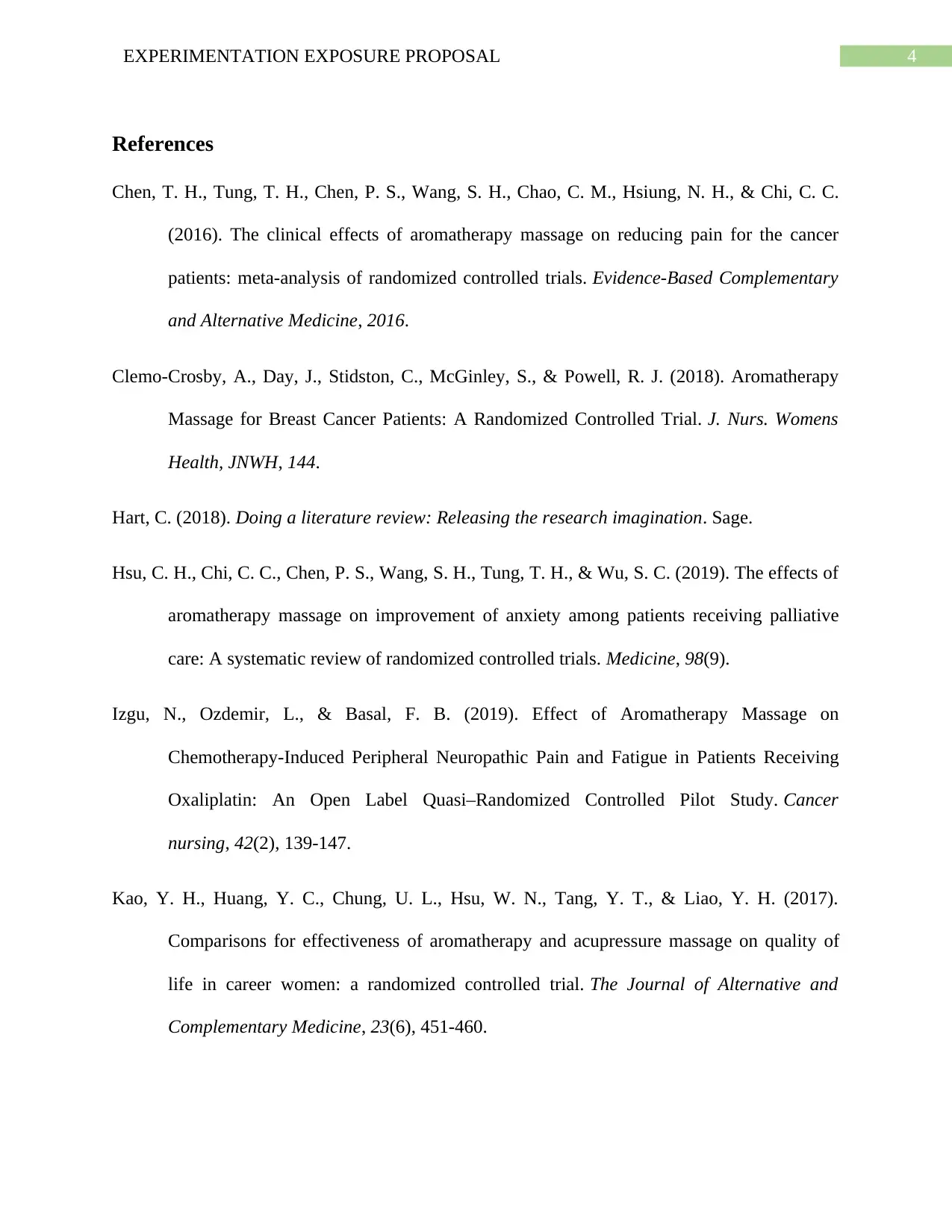
4EXPERIMENTATION EXPOSURE PROPOSAL
References
Chen, T. H., Tung, T. H., Chen, P. S., Wang, S. H., Chao, C. M., Hsiung, N. H., & Chi, C. C.
(2016). The clinical effects of aromatherapy massage on reducing pain for the cancer
patients: meta-analysis of randomized controlled trials. Evidence-Based Complementary
and Alternative Medicine, 2016.
Clemo-Crosby, A., Day, J., Stidston, C., McGinley, S., & Powell, R. J. (2018). Aromatherapy
Massage for Breast Cancer Patients: A Randomized Controlled Trial. J. Nurs. Womens
Health, JNWH, 144.
Hart, C. (2018). Doing a literature review: Releasing the research imagination. Sage.
Hsu, C. H., Chi, C. C., Chen, P. S., Wang, S. H., Tung, T. H., & Wu, S. C. (2019). The effects of
aromatherapy massage on improvement of anxiety among patients receiving palliative
care: A systematic review of randomized controlled trials. Medicine, 98(9).
Izgu, N., Ozdemir, L., & Basal, F. B. (2019). Effect of Aromatherapy Massage on
Chemotherapy-Induced Peripheral Neuropathic Pain and Fatigue in Patients Receiving
Oxaliplatin: An Open Label Quasi–Randomized Controlled Pilot Study. Cancer
nursing, 42(2), 139-147.
Kao, Y. H., Huang, Y. C., Chung, U. L., Hsu, W. N., Tang, Y. T., & Liao, Y. H. (2017).
Comparisons for effectiveness of aromatherapy and acupressure massage on quality of
life in career women: a randomized controlled trial. The Journal of Alternative and
Complementary Medicine, 23(6), 451-460.
References
Chen, T. H., Tung, T. H., Chen, P. S., Wang, S. H., Chao, C. M., Hsiung, N. H., & Chi, C. C.
(2016). The clinical effects of aromatherapy massage on reducing pain for the cancer
patients: meta-analysis of randomized controlled trials. Evidence-Based Complementary
and Alternative Medicine, 2016.
Clemo-Crosby, A., Day, J., Stidston, C., McGinley, S., & Powell, R. J. (2018). Aromatherapy
Massage for Breast Cancer Patients: A Randomized Controlled Trial. J. Nurs. Womens
Health, JNWH, 144.
Hart, C. (2018). Doing a literature review: Releasing the research imagination. Sage.
Hsu, C. H., Chi, C. C., Chen, P. S., Wang, S. H., Tung, T. H., & Wu, S. C. (2019). The effects of
aromatherapy massage on improvement of anxiety among patients receiving palliative
care: A systematic review of randomized controlled trials. Medicine, 98(9).
Izgu, N., Ozdemir, L., & Basal, F. B. (2019). Effect of Aromatherapy Massage on
Chemotherapy-Induced Peripheral Neuropathic Pain and Fatigue in Patients Receiving
Oxaliplatin: An Open Label Quasi–Randomized Controlled Pilot Study. Cancer
nursing, 42(2), 139-147.
Kao, Y. H., Huang, Y. C., Chung, U. L., Hsu, W. N., Tang, Y. T., & Liao, Y. H. (2017).
Comparisons for effectiveness of aromatherapy and acupressure massage on quality of
life in career women: a randomized controlled trial. The Journal of Alternative and
Complementary Medicine, 23(6), 451-460.
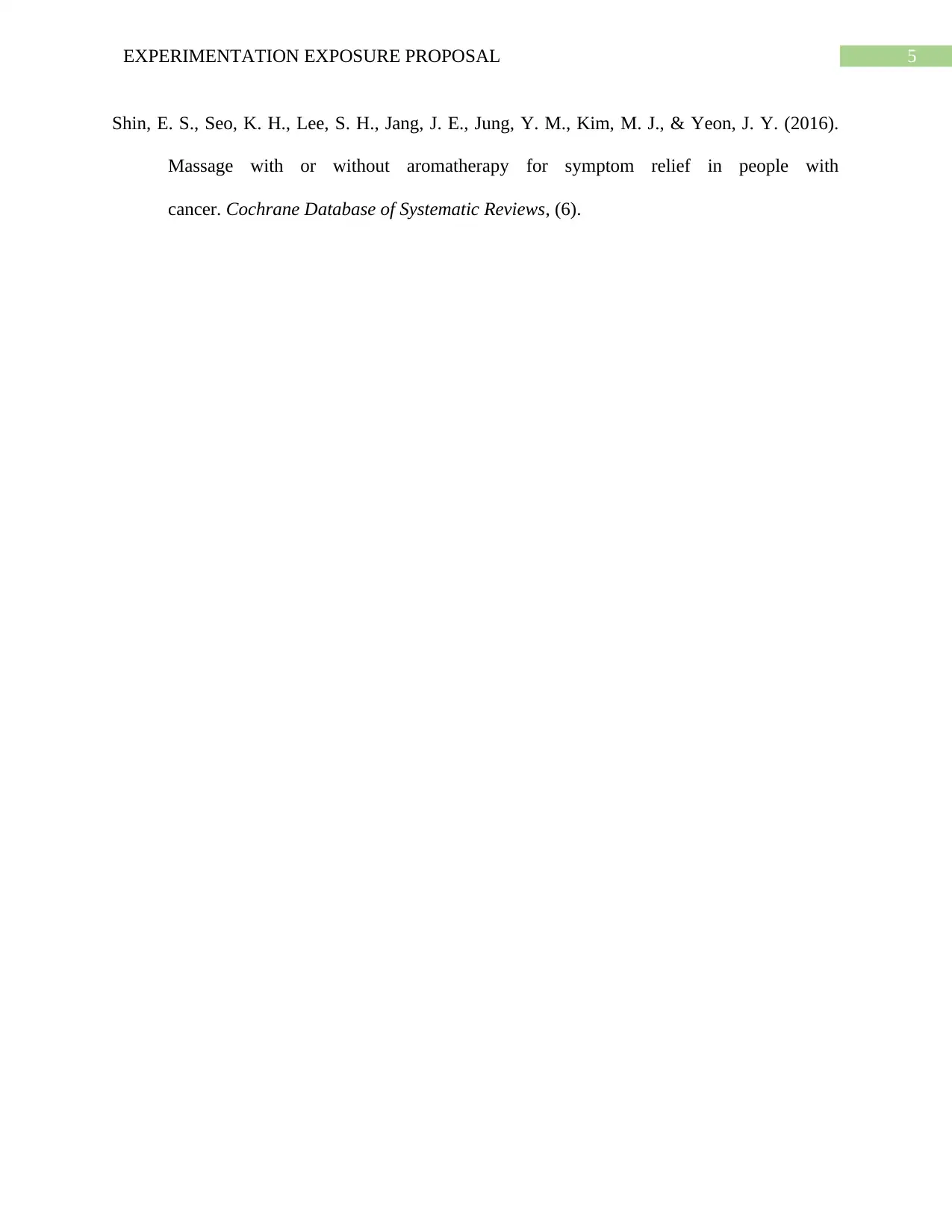
5EXPERIMENTATION EXPOSURE PROPOSAL
Shin, E. S., Seo, K. H., Lee, S. H., Jang, J. E., Jung, Y. M., Kim, M. J., & Yeon, J. Y. (2016).
Massage with or without aromatherapy for symptom relief in people with
cancer. Cochrane Database of Systematic Reviews, (6).
Shin, E. S., Seo, K. H., Lee, S. H., Jang, J. E., Jung, Y. M., Kim, M. J., & Yeon, J. Y. (2016).
Massage with or without aromatherapy for symptom relief in people with
cancer. Cochrane Database of Systematic Reviews, (6).
⊘ This is a preview!⊘
Do you want full access?
Subscribe today to unlock all pages.

Trusted by 1+ million students worldwide
1 out of 6
Related Documents
Your All-in-One AI-Powered Toolkit for Academic Success.
+13062052269
info@desklib.com
Available 24*7 on WhatsApp / Email
![[object Object]](/_next/static/media/star-bottom.7253800d.svg)
Unlock your academic potential
© 2024 | Zucol Services PVT LTD | All rights reserved.





